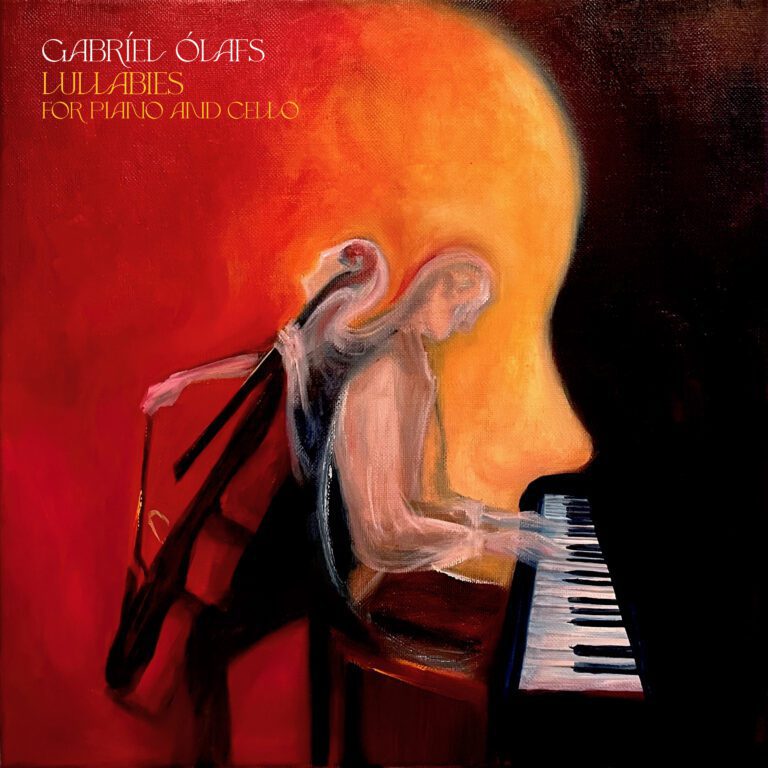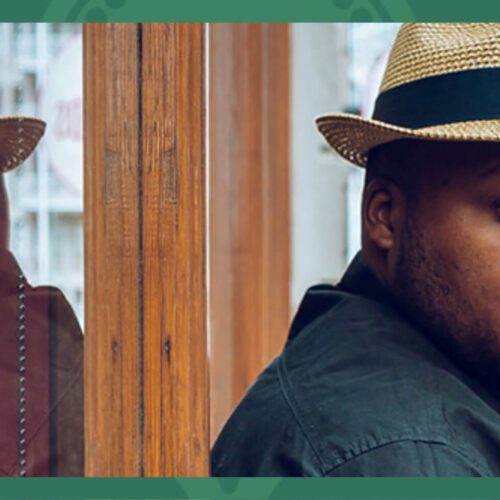Additional Information
Hailing from the northern capital of Reykjavik, the young pianist/composer Gabríel Ólafs has emerged as a rising star in the contemporary classical music scene. For his latest release out on June 9, Lullabies for Piano and Cello, Ólafs continues in his established trajectory of crafting thoroughly evocative and nostalgic soundworlds, this time partnering with Steiney Sigurðardóttir to bring to life old Viking lullabies.
PAN M 360: Being from Iceland is quite a significant part of your artistic identity, and it seems to be for other artists who come from there. For those of us who don’t know too much about Iceland, what does it mean to be Icelandic?
Gabríel: I mean it depends on who you ask, for some artists from Iceland I would say they don’t necessarily make it a large part of their creative direction but I sort of coincidentally have in my projects. My first album with Universal was based on Icelandic poetry, which is a big part of talking about Iceland, especially culturally. The art of writing is a huge, huge thing here, ever since the Vikings, who used to write a lot of poetry and stories. Storytelling is something that’s very quintessentially Icelandic. And then this new album, Lullabies, that’s coming out very soon, is very much about our heritage and exploring the storytelling aspect of being Icelandic.
Folk songs are sort of our biggest musical legacy. Because music isn’t actually a huge tradition in Iceland through the ages, weirdly enough, you know, compared to how many people live here, there’s only like 300,000 of us. Still, you have a lot of musicians, local musicians, and then also the ones that have been doing music globally like Sigur Rós, Björk, Johan Johansson, or Hildur Guðnadóttir the composer.
PAN M 360: And so what kind of stories did the Vikings like to share?
Gabríel: I would say sort of the most important piece of Icelandic storytelling would be what we call the Sagas – stories that are sometimes about sort of heroism, you know, Icelandic Vikings going abroad, going to Britain, to Eastern and Western Europe, even as far as like at the time Constantinople and Russia. Even America as well, you know, the Vikings “discovered” it before Columbus, and Canada, especially. There’s a big connection between Canada and Iceland. The Vikings were explorers and so it’s not only just storytelling, it’s also they were big documenters.
PAN M 360: Isn’t Iceland one of the few countries where the language has remained more or less the same since it was settled?
Gabríel: I really like to tell people that don’t know that. I think it’s a huge flex, because it’s almost like being in like Italy, or Spain, speaking perfect fluent Latin. Yeah, so you can pick up a book, like the sagas, and you can read it just like it was written today or something. Because it’s an island, we can thank our seclusion for it. In Denmark, Norway, Sweden, for example, they’ve been influenced by other Germanic languages. We still speak the Viking language, I think it’s very cool.
PAN M 360: So how did you go about getting a sense of what old Viking music was like?
Gabríel: Yeah, so that’s the thing. I really wish there was a bigger musical heritage here like other countries where you have like huge musical roots and resources. Iceland has very very little in terms of that and it seems that the Vikings, at least the Icelandic Vikings, weren’t big musicians. Well they would sort of sing and chant which was a big thing to be able to tell stories.
The melodies that I found are an amazing thing because they are pretty much one of the few if not the only document we have where these sort of really old folk melodies are archived. And it’s just thanks to this one guy, I think he may have been a priest. About 200 years ago, he went to collect these melodies that didn’t exist on paper anywhere and he had learned how to write music. He went to each part of Iceland, documented the most popular melodies he found. And these melodies were passed down just from memory, especially lullabies – you would sing to your child and the child would remember and then sing to their child. And that’s how it was passed on. But these melodies would be largely lost if they weren’t for this collection. I was really intrigued by that.
PAN M 360: And what did you notice about these melodies? Were there some patterns that stood out?
Gabríel: Yes, there were a couple of themes. Most of them were simple, quite simple, harmonically very simple, I would say. And most of them were quite catchy, which I think is interesting. It’s like if you write a pop song today, you need it to be catchy to catch on, right? But you need to take it to another level of catchyness if you want it to survive hundreds of years, right? Many of these melodies didn’t make the cut and these were just like the pop hits, if you will, to sing in your home for your kids and family, you know?
They also had some sort of emotion, some beauty to them, and they all had a certain, and maybe this is just how we feel now, but there’s a certain eeriness to them. They weren’t all completely cute, you know what I mean? Especially the lyrics, and though I cut the lyrics because I’m sort of transforming them and rearranging them as an instrumental work, but many of the lyrics can be quite spooky. It’s like you’re singing to your child, it starts off fine and then it’s like just going to sleep because there’s a face on your window.
PAN M 360: Ha, I feel like that’s quite common across many cultures. I noticed too that a lot of the compositions here had a sort of dorian flavour to them.
Gabríel: I have to admit that some of these, like more than half of those compositions, were composed by me. So that’s partly my fault because I also wanted to sort of put in my own sort of influence, which was really fantasy music. I’ve been into fantasy ever since I was a kid and I guess I’m that generation exposed to a huge wave of fantasy with, you know, seeing the Lord of the Rings, playing fantasy video games, and I collected like small little knights and vikings. I sort of noticed there was very little overlap and I actually haven’t talked about this anywhere, between classical musicians and fantasy fans like myself. And I would say the only overlap that happens is maybe Howard Shore with the Lord of the Rings score, where it’s obviously a brilliant composer developing that fantasy sound very heavily. And I thought to myself that I should really sneak some fantasy elements into this, so that’s also why the Dorian mode is very much there, that sense of adventure.
PAN M 360: With this release you went for piano and cello, and I just wanted to ask, what spoke to you about this specific instrumentation for this music?
Gabríel: I just finished an album where I was trying to expand my sonic palette. I had done strings and piano first and then I did an album called Solon Islandus which was for me an experiment of trying different things like different sort of ensemble sizes and it was first sort of choral work. For my new album with Decca, I went back to the drawing board and I thought like I really want to just go into something at the root of music without any bells and whistles. Piano is my first instrument and I feel like I can have a very sort of immediate emotional connection to that. Then I thought about my second favourite instrument, which is the cello, which I thought was really important for this album because I am an instrumental composer.
I really love instrumental music because when you have lyrics, you’re saying something directly and the emotional value of the song is affected by the words. I like that about my type of music, which is without words, that you can have more of a subtle thing going on. It’s less telling the listener what to think and being more open to their interpretation of the music. I didn’t want any lyrics, but the cello has a very vocal quality, a very sort of singing quality, and you can sort of capture the same effect as when you have a singer. So there’s no emotional quality that’s lost, I feel. And I also just love this cellist, she is my really good friend.
PAN M 360: Can you share a bit about what it’s like to be a young artist in Iceland today?
Gabríel: So there’s a really powerful musical scene in Iceland and the musical scene here is very diverse. There’s a lot of pop music, especially made for the local market, which I know sounds crazy because it’s so small, but there’s a lot of it, and I have many friends that make pop music only for Iceland – it’s in Icelandic and it’s on the radio. And then you have a very strong experimental scene as well. Experimentalism is very intertwined with the Icelandic sound. You have artists like Björk, who is very experimental pop, then you have people like Johan Johansson and Sigur Rós really doing something experimental with post-rock. I would say like in terms of my friends here in the music scene I’m a little bit different because I am taking a more traditionalist approach. I am trying to say something new, but for some reason as an artist right now, I am quite into using a language that already exists. I think if you are good enough at writing melodies and creating music, you can do something new with the tools that already exist, that challenge is what fascinates me.
I’m not saying that maybe down the line I won’t love to experiment even more with my sound palette, but for now I am a little bit out of the group here because I’m working with piano and cello instead of banging drums inside a helicopter or something haha.
PAN M 360: At least not yet!
Gabríel: Yeah, that’s later, maybe!
PAN M 360: I look forward to it regardless. Thank you Gabríel, all the best.























